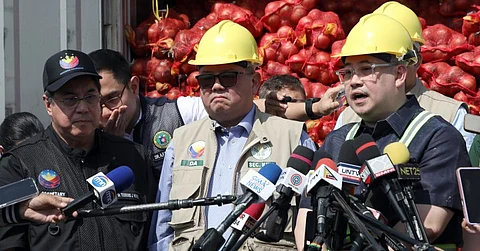
- NEWS
- the EDIT
- COMMENTARY
- BUSINESS
- LIFE
- SHOW
- ACTION
- GLOBAL GOALS
- SNAPS
- DYARYO TIRADA
- MORE

The Department of Agriculture (DA) is moving to repurpose smuggled frozen mackerel recently seized at Manila and Subic ports into emergency food assistance, amid rising demand for relief as floods strain logistics and disrupt local food distribution networks.
Agriculture Secretary Francisco Tiu Laurel Jr. said he will recommend to President Ferdinand Marcos Jr. the release of the confiscated goods, following laboratory confirmation that the fish are safe for human consumption.
Redistribution through various agencies
Tested by the Bureau of Fisheries and Aquatic Resources (BFAR) for histamine and microbiological contaminants, the frozen mackerel passed food safety standards and are now being eyed for redistribution through agencies such as the Department of Social Welfare and Development (DSWD) or the Office of the President.
“When President Marcos led the distribution of tons of frozen fish last December, thousands of vulnerable Filipinos received an unexpected gift,” Secretary Tiu Laurel said.
“But today, the need is far more urgent. Millions have been displaced, and communities are still reeling from the devastation caused by widespread flooding. This may be a small gesture, but it could bring meaningful relief to countless struggling Filipinos.”
Container vans intercepted in North Harbor
Seven container vans — two intercepted at the North Harbor in Manila and five at the Subic Freeport — were confiscated following a joint inspection by the DA’s Inspectorate and Enforcement Office and the Bureau of Plant Industry (BPI).
Each van carried an estimated 30 metric tons of fish, for a total haul of 210 metric tons — enough to distribute one kilo of mackerel to 210,000 households.
More shipments are currently under inspection, with the DA and BPI anticipating the discovery of additional unregulated imports.
Monitoring
The DA is also monitoring for broader implications on market prices and inventory levels, especially with domestic supply chains facing logistical delays from the floods.
Meanwhile, the BPI recommended the destruction of onions found in the seized containers, citing visible signs of decay. Though tests showed no contamination from bacteria, heavy metals, or pesticides, the products were deemed unfit for human consumption.
